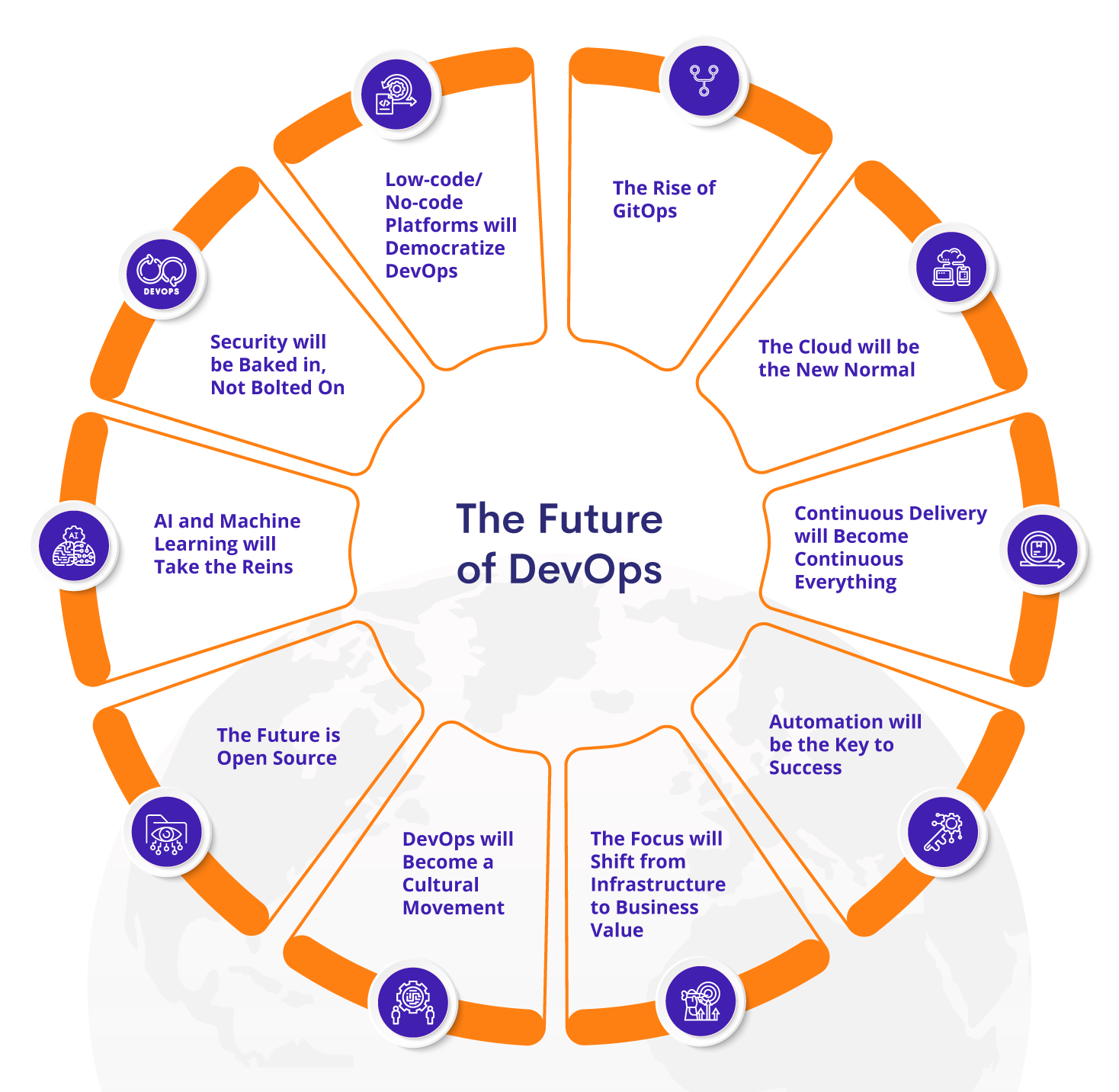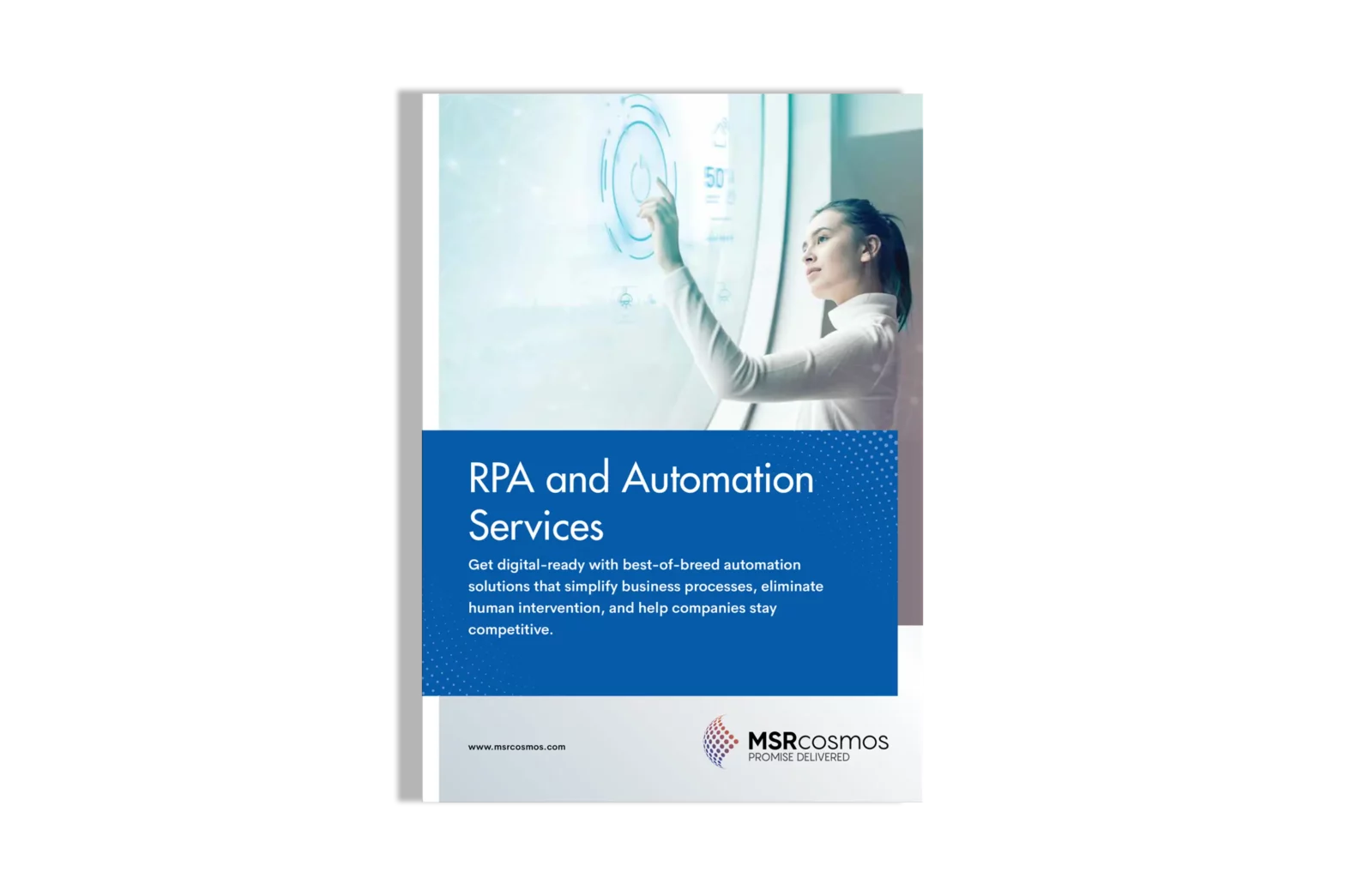- Blog
- December 13, 2023
The Future of DevOps: A Glimpse into the Crystal Ball

- Blog
- December 13, 2023
The Future of DevOps: A Glimpse into the Crystal Ball
DevOps, the marriage of development and operations, has revolutionized software delivery. But the landscape is constantly evolving, and the question arises: what does the future hold for this dynamic field? Let’s delve into the crystal ball and explore some potential trends shaping the future of DevOps:

1. AI and Machine Learning will Take the Reins
Repetitive tasks like code reviews, bug identification, and performance optimization will be increasingly automated by AI and machine learning. AI-driven tools, equipped with advanced anomaly detection and pattern recognition capabilities, will automatically identify and flag potential bugs, significantly reducing the manual effort traditionally required for debugging. This will free up valuable human resources for more creative and strategic work, propelling DevOps to new heights of efficiency.
2. Security will be Baked in, Not Bolted On:
Security will no longer be an afterthought in the DevOps workflow. It will be seamlessly integrated into every stage of the development process, from code writing to deployment, ensuring robust and secure software from day one.
3. Low-code/No-code Platforms will Democratize DevOps:
The advent of low-code/no-code platforms marks a transformative shift in the evolving landscape of software development. These user-friendly platforms will empower non-technical individuals to participate in the development process, fostering collaboration and accelerating innovation. From business analysts to domain experts, non-technical contributors can now engage seamlessly, breaking down silos and fostering a collaborative environment. In essence, these platforms democratize the development landscape, ensuring that innovation is not confined to a select group of experts but is a shared endeavor.
4. The Rise of GitOps:
GitOps, a declarative approach to managing infrastructure, will gain further traction, offering greater control, consistency, and auditability to the DevOps pipeline. In the future of DevOps, transparency and accountability take center stage, and GitOps is a key enabler. With every modification meticulously captured in version history, teams benefit from an audit trail that facilitates easy tracking of changes and swift rollbacks in case of unforeseen challenges. GitOps would enhance the visibility into the DevOps pipeline, fostering a culture of accountability and transparency—a crucial aspect as organizations navigate the complexities of modern software delivery.
5. The Cloud will be the New Normal:
The future of DevOps is synonymous with innovation, and the cloud lays the foundation for unparalleled flexibility. Cloud-based platforms and services will become the norm, providing on-demand scalability, flexibility, and cost-effectiveness for DevOps teams. Cloud’s influence will reach new heights, transforming it from an alternative solution to the standard operating model for organizations of all sizes.
6. Continuous Delivery will Become Continuous Everything:
The concept of “Continuous Everything” signifies a paradigm shift—a departure from the siloed and linear processes of the past. DevOps will evolve beyond just code deployments to encompass continuous testing, monitoring, and feedback loops, ensuring a seamless and iterative approach to software development. Embracing this comprehensive approach ensures not only the seamless delivery of code also a harmonious orchestration of testing, monitoring, and feedback that defines the essence of DevOps excellence
7. Automation will be the Key to Success:
In the unfolding narrative of the future DevOps landscape, the beacon guiding success will undeniably be automation. Automated deployments, infrastructure provisioning, and configuration management will become commonplace, further streamlining the DevOps pipeline and eliminating manual errors. The key to unlocking agility, reliability, and precision lies in the strategic embrace of automated workflows, paving the way for a DevOps ecosystem where innovation flourishes unencumbered by the constraints of manual intervention.
8. The Focus will Shift from Infrastructure to Business Value:
DevOps will increasingly focus on delivering business value, with metrics like customer satisfaction, revenue growth, and market share becoming key performance indicators for success. This paradigm shift underscores the transformative role of DevOps as not just an IT initiative but a strategic enabler for organizational success.
9. DevOps will Become a Cultural Movement:
The collaborative, agile, and data-driven principles of DevOps will permeate all aspects of an organization, extending beyond software development to other departments and stakeholders. This evolution heralds a holistic embrace of DevOps principles, fostering a collaborative spirit that transcends silos and empowers diverse teams to work seamlessly toward shared goals. As DevOps transitions from a methodology to a cultural cornerstone, organizations will unlock not only the efficiencies in software delivery but also a cultural shift that champions innovation, responsiveness, and a collective commitment to excellence.
10. The Future is Open Source:
Open-source tools and platforms will continue to play a vital role in the DevOps landscape, fostering collaboration, innovation, and rapid development. Embracing the ethos of transparency and community-driven development, open-source solutions become the bedrock of collaboration, allowing diverse teams to contribute, iterate, and innovate collectively. The future of DevOps will witness the continued surge of open-source tools, fostering an environment of rapid development where adaptability and shared knowledge propel organizations toward unprecedented heights of efficiency and excellence.
Conclusion
While the future of DevOps is exciting, it’s not without challenges. Security concerns, talent shortages, and organizational resistance to change need to be addressed. Nonetheless, by embracing these trends and adapting to the evolving landscape, organizations can leverage the full potential of DevOps to achieve success in the digital age.




